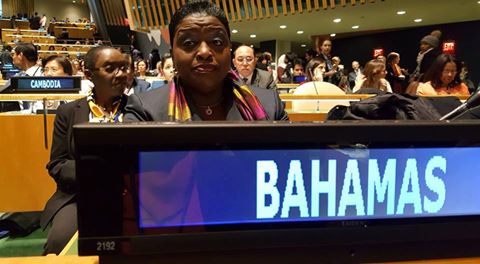MINISTER GRIFFIN INFORMS GLOBAL BODY OF BAHAMAS EFFORTS TO PROMOTE ECONOMIC EMPOWERMENT FOR WOMEN
MINISTER GRIFFIN INFORMS GLOBAL BODY OF BAHAMAS EFFORTS TO PROMOTE ECONOMIC EMPOWERMENT FOR WOMEN
UNITED NATIONS, New York — The Sixty-First Session of the Commission on the Status of Women (CSW61), the principal global inter-governmental body concerned with gender equality and women’s economic empowerment, commenced on Monday, March 13, 2017 at the United Nations Headquarters in New York.
The annual session will close on Friday, March 24, 2017 following the conclusion of a busy two weeks of, among others, a general debate, ministerial and high-level inter-active dialogues, expert panels and over 400 side events related to the session’s priority theme, “Women’s economic empowerment in the changing world of work.”
Representatives of Member States, United Nations entities and accredited non-governmental organisations from all regions of the world are participating in the event.
The Bahamas delegation to CSW61 is lead by the Minister of Social Services and Community Development, the Hon. Melanie S. Griffin.
Following is the full text of the statement delivered by Minister Griffin on Wednesday, March 15, 2017 on behalf of The Bahamas, on the occasion of CSW61.
NATIONAL STATEMENT BY THE HONOURABLE MELANIE S. GRIFFIN, M.P., MINISTER OF SOCIAL SERVICES & COMMUNITY DEVELOPMENT THE COMMONWEALTH OF THE BAHAMAS ON THE OCCASION OF THE SIXTY-FIRST SESSION OF THE COMMISSION ON THE STATUS OF WOMEN, UNITED NATIONS, NEW YORK, MARCH 15, 2017
Mr. Chair,
I am pleased to be at this 61st Session of the Commission on the Status of Women and to extend to you and the members of your Bureau my congratulations on your election. The Bahamas assures you of its full cooperation and support during your tenure and aligns itself with the statements delivered on behalf of the Group of 77 and China and the Caribbean Community.
Mr. Chair,
It is undeniable that women across the globe have made notable progress in many spheres of society. This reality also holds true for The Bahamas – particularly in the area of education where females represent more than 50 percent of graduates at the secondary and tertiary levels. This success of women and girls at all levels in the educational system has resulted in their increasing numbers in the work force and enhanced economic empowerment.
However, there is a disconnect, Mr. Chair, between the success for women in education in The Bahamas and women in leadership. Traditionally, and more particularly within the last 10 years, more than 70 percent of graduates from the University of The Bahamas have been women. Yet, currently only 18 percent of women take up political leadership roles and 19 percent occupy private sector leadership positions in the country. While women represent 49 percent of the workforce, they are generally at lower-income levels, reflecting a deficit of females in high-level decision making positions – both in private and public sectors. In the home, women take the lead in childrearing, caregiving and other unpaid work; a responsibility which should be shared with men in solidarity with women and in recognition of their parenting and other critical roles.
Mr. Chair,
Allow me to share with this august body, three initiatives that the government of The Bahamas has initiated to address women in the changing world of work and to promote women’s economic empowerment in keeping with the Sustainable Development Goals.
In March 2016, the Ministry of Social Services and Community Development launched the Renewing, Inspiring, Sustaining, and Empowering Programme, known as RISE. This program is a conditional cash transfer programme, which supplements incomes for families, breaking the cycle of poverty. The programme aims to reduce income inequality, increases economic mobility and improves the welfare of women and children who are the primary beneficiaries.
October 2016 saw the transition from the Bureau of Women’s Affairs to the newly established Department of Gender and Family Affairs. The Department aims, inter alia, to empower women to lead and partner equally with men in nation building. As recent as International Women’s Day 2017, some sixteen women completed the ‘Women in Leadership and Decision Making’ course, held in conjunction with the University of The Bahamas. The first cohort of this course led to two women being ratified as candidates for the upcoming general elections; two of whom are a part of our delegation.
An approved draft 25 year National Development Plan, was presented in December 2016. Among other things the Plan aims to improve conditions for women in the workplace by introducing:
more childcare and breastfeeding facilities,
legislation to promote gender equity in board appointments, and
social security benefits that address vulnerable groups of women.
Mr. Chair,
We expect that these three initiatives will spark recognition about the different realities faced by women and men in the development process and reinforce the need to tailor programming accordingly.
Mr. Chair,
We expect that there will be challenges such as the impact of disasters. Often, development resources including for women’s empowerment, are diverted to disaster preparation, response, and recovery efforts. Nevertheless, The Bahamas remains committed and looks forward to partnering with you to create by 2030, planet 50:50.
Thank you.

